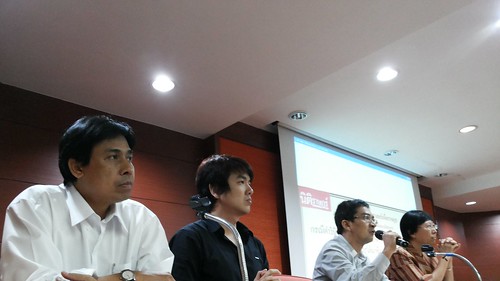The Constitutional Court’s latest ruling was full of serious errors, pointed out the courageous “Nitirat” group of law academics after the Court judged last week that the attempt by the ruling Pheu Thai MPs to amend the coup-makers’ charter to change the senate from being partly elected and partly appointed to fully elected was unconstitutional. The group also urged the Parliament to defy the court's decision.
Four of seven Nitirat members. From Left: Theera Sutheewarangkoon, Piyabutr Saengkanokkul, Worajet Pakeerut and Jantajira Iammayura
The Constitutional Court last week handed down its decision that the attempt by the ruling party was a breach of Section 68 of the 2007 Constitution which prohibits any attempt to “overthrow the democratic regime of government with the king as the head of state under this Constitution”.
The court reasoned that having only elected senators would open the doors for the “tyrant majority” and a “monopoly of state power” because the system would be abused and lead to a senate which was not independent. It would also allow a so-called “spouse parliament”, where representatives in both the lower and higher houses were from the same family. An all-elected Senate would be against the spirit of the charter which aims to have the senate counterbalance MPs.
Before the coup in 2006, Thailand had enacted the 1997 Constitution, dubbed the “People’s Constitution” because it was drafted with public participation. This was hailed as a landmark in Thai political reform. That charter, aimed at creating stable governments, was seen as paving the way that let now self-exiled Prime Minister Thaksin Shinawatra cling on to power with landslide majorities before he was ousted by the coup d’etat in 2006. Under the 1997 charter, for the first time in Thai history, the Senate was fully elected.
Worajet Pakeerut, a leading member of Nitirat (Enlightened Jurists), said on Saturday that the claim of protecting the minority was actually very vague, and that majority rule did not seem to breach Section 68. This also reflected that the Constitutional Court did not adhere to the principle of democracy.
The academic reasoned that in a democratic society with a large number of people, where it is hard to reach a consensus, majority decision-making is the way to end disputes. The voice of minority is still protected. However, protecting the minority does not mean complying with the minority, but allowing them to voice their opinion in order to convince the majority.
“The Constitutional Court does not represent the minority, but the Opposition instead represents the minority,” Worajet said. “What the court should do is to stand in the middle and give rulings.” He added that there is no evidence that the minority in this country has no place to stand, nor any evidence to support the claim that there is no entity to counterbalance the majority. The Constitutional Court, the media and the public are examples of such entities, he said.
“This justification [about protecting the minority] in the verdict is an attempt to control the majority in order to achieve the minority’s aims. This is to help the minority destroy the intention of the majority,” pointed out Worajet. “This is actually supporting a tyrant minority,” he concluded.
The academic went on to say that the court itself had breached the constitution because under the constitution, it was not entitled to accept petitions itself, but must accept them through the Office of the Attorney-General.
“What happened was that the minority who lost the parliamentary vote submitted a petition directly to the Court and the Court accepted it. The petition was to respect the procedure written in the Constitution,” said Worajet.
By accepting cases regarding Section 68, the Court is abusing its power by over-interpreting the section. It is believed that more and more cases will be submitted. “[The Constitutional Court] is being transformed into a “super-organisation,” he said. “The Constitutional Court is re-writing the constitution by itself.”
Moreover, Worajet urged the parliament to defy the Constitutional Court's ruling since the ruling does not respect the procedure written in the charter, does not adhere to the democratic principle and even unconstitutional in itself.
"If the involved state agencies comply with the court's decision, it will have a repurcussion on the democratic system, the principle of sepration of power, and more importantly, the Parliament would never be able to amend the constitution to reflect the people's intention," he said. "We would then have to live under the 2007 charter forever."
He added that the Parliament does not need to abide by the ruling. Despite the ruling, the draft is still there before the king for the royal endorsement. The court is not authorised to say what to do or not to do next. The regular procedure continues, said Worajet.
Nitirat, composed of seven law academics from leading Thammasat University, held a press conference at the university in Bangkok on Saturday afternoon.

